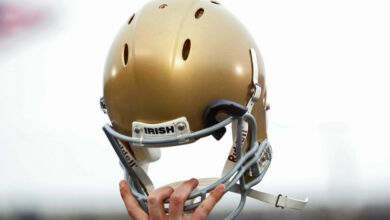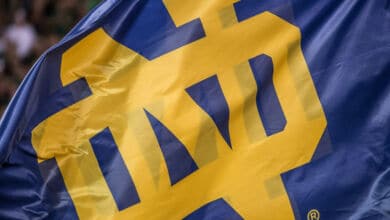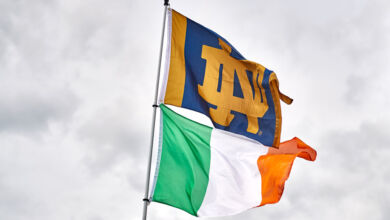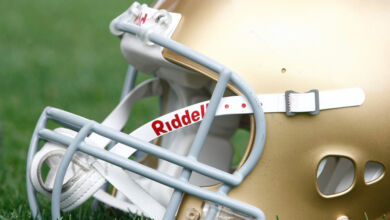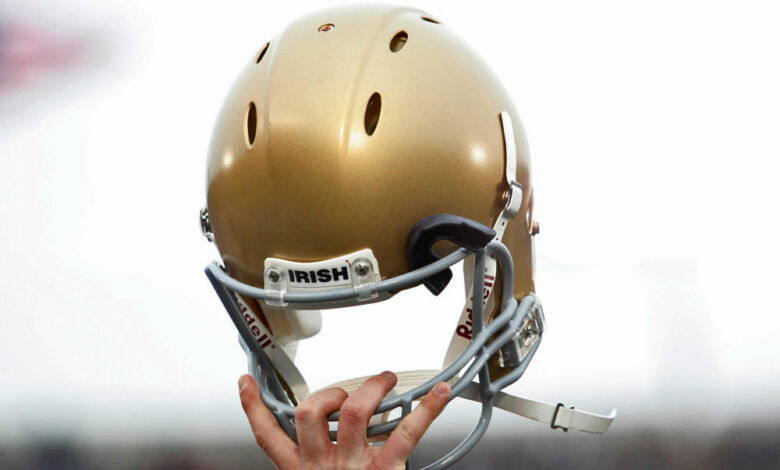
Any battle between major schools with strong football programs will get attention and that was the case on November 8, 1952. On that date, the Oklahoma Sooners traveled to Notre Dame to face the Fighting Irish in an important matchup, with approximately 10,000 Sooner fans also making the trip. Oklahoma entered the game ranked fourth, while Notre Dame was situated in the tenth spot.
Despite the home-field advantage for the Irish, the Sooners were installed as double-digit favorites and were one of multiple teams bidding to capture the national title. One of the teams ahead of them was long-time Notre Dame rival Michigan State Spartans, who were set the face the Irish the following week.
Winning as an underdog wasn’t a foreign concept for the Irish during the 1952 campaign. They had previously knocked off Texas and Purdue, but doing the same against a powerhouse like Oklahoma presented a huge challenge. The importance of the game was represented by the fact that it was being nationally televised by NBC.
The Coaches: Clash of Titans – Leahy vs. Wilkinson
Frank Leahy’s tenure as Notre Dame head coach spanned from 1941-53, missing the 1944 and 1945 campaigns to aid the war effort. During that period, the Irish captured four national championships and leading into this clash, he’d compiled an outstanding record of 75-10-8 at the school. His 1952 squad sported a 5-1 mark before taking the field against the Sooners.
Bud Wilkinson was in the sixth of his legendary 17 seasons at Oklahoma and had already put together a record of 51-6-3 entering this game. The Sooners entered the game with a record of 5-0-1 and hadn’t lost since October 1951. The year before that, Wilkinson had led Oklahoma to the first of three national titles during his Sooners career.
The Key Players: Future Heisman Winner Leads Irish
Splitting time at quarterback for the Irish were Ralph Guglielmi and Tom Carey, with Guglielmi taking the majority of snaps. The Notre Dame running game primarily used the duo of Johnny Lattner, who would win the Heisman a year later, and Neil Worden on the ground to combine for over 1,200 yards gained. In addition, Joe Heap offered running skills and pass-catching ability.
The potent Oklahoma offense was ranked second in the country in total offense as they prepared to face the Irish. Quarterback Eddie Crowder didn’t pass much, but was part of a dominant running game that included the duo of Billy Vessels and Buck McPhail, with fellow back Buddy Leake’s ailing ankle limiting his efforts in the game. On defense, the Sooners had allowed only six points over the previous eight quarters.
The Game: Late Game Heroics Secure Notre Dame’s Victory
The Irish appeared to get the first break of the game on the opening play from scrimmage when the Sooners fumbled the ball away. Notre Dame linebacker Dan Shannon caught the ball in mid-air but the drive stalled out deep in Oklahoma territory and the Irish field goal attempt missed to keep the game scoreless.
It would be the Sooners who tallied the first points when they were able to take advantage of a weak 20-yard punt from Lattner in the latter part of the first quarter. Crowder only needed one play to connect with Vessels, who romped down the sidelines for a 28-yard touchdown pass and a 7-0 Oklahoma lead.
After taking the first punch, the Irish responded midway through the second quarter when Guglielmi began a 59-yard drive that ended when he found Heap on a 16-yard scoring toss with approximately four minutes left until halftime. The Notre Dame defense held but Worden’s fumble gave it back to the Sooners, who gave it to Vessels at their 38 and watched him race virtually unscathed for a 62-yard score and a 14-7 halftime advantage.
Once the break had ended, the Irish running game went to work on a 15-play drive that encompassed 74 yards down to the Oklahoma six-yard-line. The excitement of possibly tying the game ended abruptly when Lattner had trouble handling a Carey pitchout, with the Sooners recovering the fumble.
Lattner didn’t waste much time atoning for his turnover when he picked off a Crowder pass at the Oklahoma 35 and returned it 28 yards to their seven-yard-line. After a penalty, Worden scored on the third play of the drive and things were even at 14 points apiece.
Vessels again delivered a blow to the Irish upset hopes with 4:35 to go in the third period. His scoring run down the sidelines off a pitch from Crowder gave the Sooners what turned out to be their final lead of the contest.
Getting the third deadlock of the game, Notre Dame began its series at their own 21. From there, a halfback option pass from Heap to Lattner gained 36 and Worden capped the drive with a three-yard scoring run to make it 21-21 in the opening minute of the final quarter.
On the ensuing kickoff, Oklahoma fumbled after a huge hit from Shannon and Al Kohanowich recovered for the Irish at the Sooner 24. Lattner broke off a 17-yard run and Carey then picked up the winning score on a one-yard sneak. However, the Sooners were able to block the extra-point attempt, making for some nervous moments in the final 13:25 of action.
Oklahoma had three tries to keep their record spotless on the year, with the first effort ended by a punt. On their next series, the Sooners fumbled the ball away but got it back at their own 45 with 2:35 remaining. With less than a minute left, Oklahoma moved the chains on a clutch double reverse that moved the ball to the Notre Dame 25. On the game’s final play, Vessel’s throw into the end zone was knocked down by Paul Reynolds and the Irish had their victory.
The Aftermath
The good fortune enjoyed by Notre Dame didn’t last after they dropped a 21-3 road decision at Michigan State. Two shutout wins over Iowa and arch-rival Southern Cal, respectively, helped the Irish end the year with a 7-2-1 record. As was the school’s custom for many years, Notre Dame did not compete in a bowl game.
The Sooners finished strong with three consecutive routs in which they outscored opponents, 135 to 27 and were invited to play in the Orange Bowl. However, as members of what was then known as the Big 7 Conference, they were forced to abide by the league’s ban on bowl competition.
Leahy would coach the Irish for only one more year, with a decade-long decline then beginning for the program. Wilkinson would remain at Oklahoma until 1963, leading the Sooners to national titles in both 1955 and 1956.
